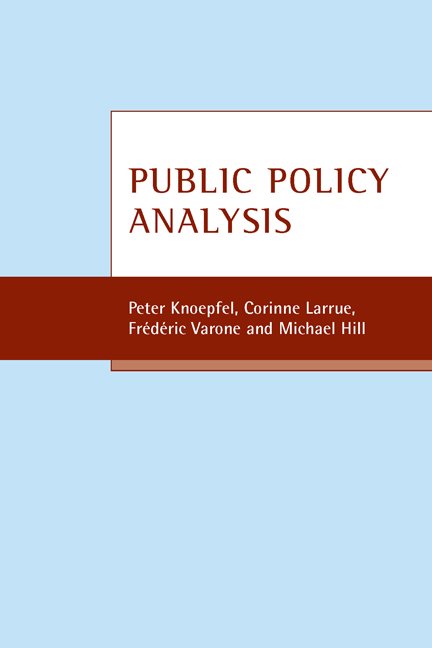twelve - Conclusion
Published online by Cambridge University Press: 14 January 2022
Summary
This review of the arguments and cases discussed throughout the book is primarily intended to prompt researchers and practitioners working in the area of policy analysis and management to revisit the arguments presented, develop them further, complement them with other theoretical approaches and apply them in actual analysis situations. Thus, we present some reflections on the strengths (Section 12.1) and weaknesses (Section 12.2) of our theoretical concepts and their application in concrete cases. Finally, we describe two possible future directions for the development of policy analysis (Section 12.3), that is, governance and institutional regimes.
12.1 Strengths of the proposed approach
Based on our experience in teaching and research (both theoretical and applied), we believe that the analysis model presented in this manual has the advantage of not being centred on a single theoretical, and always normative, conceptualisation of the state, but rather offers a balanced approach to the analysis of public policy.
(a) Rejection of a single theory of state
As stated at the beginning of this book (see Chapter One), our analytical model does not propose to develop a new theory on the functioning of the state and its position with respect to civil society in general. To put it in more positive terms, the position on which our conceptual work throughout this book is based stems from our desire to present a model that can be applied in the context of a broad range of conceptualisations and interpretations of the state and its actions. What we have in mind here, for example, are the diverse and often strongly diverging theories on:
• the relationships between public and private actors (for example, neo-Marxist, neo-corporatist and neo-liberal approaches);
• the access to resources available to different categories of actors (for example, the analysis of networks based on the interdependency of resources between actors);
• the role of general or constitutive institutional rules in the context of the effectiveness of public action.
Thus, our analytical model aims to remain open to a number of theoretical trends in the area of the public sector and state action that are inspired by law, politics and economics. However, this openness assumes that the promoters of the various approaches in question will accept the principle of the operationalisation and empirical verification of the concepts and hypotheses on which their theory is based.
- Type
- Chapter
- Information
- Public Policy Analysis , pp. 273 - 288Publisher: Bristol University PressPrint publication year: 2007



